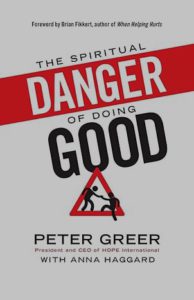Proceed With Caution: A Synopsis of The Spiritual Danger of Doing Good

Amanda Fisher
Foundations Workshop Coordinator
Read more from Amanda
Jump to:
The Purpose of the Book | The Perspective | The Key Points | Details We Love | Considerations | Who Should Read This?
Individuals doing good work in the church and nonprofit realms often claim there is no greater joy than seeing an individual move from poverty to a flourishing life. However, these same good works can also be dangerous to spiritual health; our charity and kindness can have a dark side. In his book, The Spiritual Danger of Doing Good, Peter Greer outlines common pitfalls for Christians dedicated to serving others.
Peter Greer has dedicated his life to serving the poor, authored multiple books, and serves as the President of Hope International. In this deeply transparent work, he invites the reader to learn from his personal journey of “doing good.” He provides a list of warnings and engaging illustrations with the desire that others might not succumb to the temptations that accompany good works.
Greer’s awakening to the dangers of doing good came through the story of the prodigal son. Like most, Greer focused on the younger brother who disobeyed his father, the separation that resulted, and their eventual reunification. But when Greer began to focus on the eldest son, he realized that both brothers were separated from their father because their focus was on themselves.
He noticed the same tendency toward recognition, among other selfish motives, in himself. Likewise, those who work in the poverty-fighting space can inadvertently become separated from God, and Greer cautions do-gooders to avoid these dangers:
1. Giving Leftovers to Loved Ones:
Ministry leaders are at risk of justifying an unhealthy emphasis on work. The lie regarding ministry that Greer fell for is this: If Serving God Through Service = Good, then Serving God Through More Service = Better. Greer shares “guardrails” he put in place that saved his marriage: be present, regularly evaluate the health of your relationships, limit travel, be watchful of an elevated view of your importance, and invest in friendships.
2. Doing Instead of Being:
Often ministry leaders lose the focus of their original calling – their “why” – and instead focus on the tasks – the “what.” Greer states, “…we can spend our lives giving, serving, and going, but if it is apart from His Spirit, it amounts to a garbage pile of good intentions.” He encourages the reader to think about their “why,” accept God’s grace for anything less than pure intentions, and work to bring the message of that grace to others.
3. Justifying Minor Moral Lapses for a Good Cause:
Ministry leaders can convince themselves that small untruths are acceptable if it benefits the ministry. He reminds us that this is an entitlement mentality and is “morally toxic” – just because a person does good things doesn’t mean they are above the system. He encourages leaders to begin with the small decisions each day, increase the guards around their hearts, and realize the “frailty of [their] own willpower.”
4. Using the Wrong Measuring Stick to Define Success:
As Hope International exploded in growth, they were validated in their good works when the graphs kept moving “up and to the right.” However, when the numbers stalled, they became aware of organizational problems, including, but not limited to, their inaccurate definition of success. This painful experience was an opportunity to gain a new perspective and rebuild with a “fanatical obsession with operational excellence” and “a spirit of humble dependence upon God.”
5. Friendship Superficiality:
People who do good are often put on a pedestal yet have no greater immunity to temptation than anyone else. Investing in relationships and being deeply known builds character and provides accountability. Greer has what he calls his “3 AM” friends – those who he can rely upon no matter the time of day, and he encourages ministry leaders to identify theirs.
6. Elevating the Sacred Over the Secular:
After college, Greer was ready to jump into full-time ministry overseas. When openings did not arise immediately, he took a secular position and found himself feeling “less-than.” He had created a false hierarchy of importance when it comes to careers, with those in full-time ministry at the top. Creating a dangerous “God-loves-my-job-more-than-yours” mentality, Greer reminds us, “If you are a follower of Jesus, you are already in full-time ministry, no matter where you spend your days.”
7. Thinking You’re the Superhero in Your Story:
In order to satisfy a deep fear that we are not good enough, we tend to crave recognition for our good deeds rather than giving credit to God. Greer advises us to get over ourselves. In our praise-focused culture, we must stop our own self-serving desire for attention and instead uncover God in “small, unseen, and unrewarded acts of compassion.”
8. Not Having Ears to Hear the Uncomfortable Truth:
Though there is nothing wrong with receiving compliments for good work, we also must be open to honest criticism and be willing to change as a result. Greer contends, “Critics often speak a word of truth we need to hear.”
9. Forgetting Your True Identity:
Those who do good are often at risk of confusing their work with their identity. Through both personal and biblical examples, Greer reminds us that first and foremost we must remember who God is and our identity in Him is the “only one that will last.”
10. Thinking Good Things Always Happen to Good People:
“Christian karma” permeates the North American culture and the church. Although good things do not always happen to good people, Greer points out, “[T]he Good Shepherd is still good and invites you and me to be His hands and feet to those in need, even when we don’t have answers to the difficult problem of pain and suffering.”
11. Seeing Everyone’s Sin but Your Own:
Having served in some of the most impoverished areas of the world, there was a point at which Greer found himself judging the spoiled, wealthy culture of Americans. He wasn’t aware of his sin until a colleague visiting from where he had served overseas pointed out Greer’s own wealth. He encourages ministry leaders to invite people into their life who will point out their blind spots.
12. Being Obsessed With What Others Think:
Being preoccupied with the approval of others is “detrimental to our faith.” Greer shares his own tendency toward this with a specific example of attempting to connect with an audience overseas by speaking their native language. Intending to welcome them with open arms, he inadvertently welcomed them “with open legs!” He spent hours obsessing over his performance and worrying about what people thought. He encourages us to stop performing, because “…when we fully embrace [God’s] extraordinary love, we simply don’t have time to care so much about what others think.”
13. Disconnecting Knowledge from Action:
Head knowledge isn’t enough. The Pharisees followed all the rules, memorized the most scripture, fasted and prayed, but lived a life without love. Greer shares that there are three necessary components to ministry: head (knowledge), heart (emotions), and hands (action). A balance of the three makes ministry most effective.
14. Pretending to Have It All Together:
People who “do good” tend to be wired in a way that they want to “keep things looking good on the outside no matter how much pain [they] might be in.” This focus on external appearances rather than the heart condition is toxic and prohibits Christians from connecting through their brokenness. In this chapter, Greer vulnerably lists areas where he is prone to pretending to have it all together and offers hope and freedom for those who struggle in this area.
Using the wrong measuring stick to define success is similar to one of the three pillars of True Charity Initiative: The most effective charity is outcome-driven. While many churches and nonprofits tout success as the number of people present, the number of pounds of food given away, or the amount of money given, better measures of success are related to life transformation (i.e., as a result of our work, how many people are reunited with their family, gainfully employed, attending church, paying their own bills?). True Charity Network members can access our Outcomes Toolkit for a detailed guide on how to get this right in their ministry.
The spiritual danger of “Not Having Ears to Hear the Uncomfortable Truth” applies to everyone, both the helpers and those being helped. Additionally, the most effective charity is challenge-oriented. In order to develop, we must be challenged. Listening to uncomfortable truths about ourselves is vital in this change process.
Poverty-fighters are prone to disconnecting knowledge from action; their heads, hearts, and hands are unbalanced. They have the head knowledge and agree with common platitudes like, “We need to give a hand-up and not a hand-out.” They also have the heart or compassion; a true desire to help people and foster life change. But often, the head and heart are separated from what the hands are doing, and they often end up hurting those they intended to help. To combat this imbalance, we built the True Charity Network as a one-stop-shop of educational resources and practical tools to guide people in their efforts toward effectiveness.
This book focuses on the dangers good work has on the helper. Other equally important books like When Helping Hurts and Toxic Charity focus on the dangers that helping has on those being helped. It is to the advantage of the charity worker to learn about both.
Some might ask, “If doing good can be dangerous to me spiritually, then shouldn’t I just stop doing good?” Although the intent of the book isn’t to dive into scripture about God’s instruction to help the poor, the author does address this in the final section of the book – it is important to remember our “why.” We owe “gratitude to God who knows we aren’t perfect, who recognizes that we are a mess, and who loves us anyway.” Our doing good is “simply a response to the most radical generosity the world has ever known.” Keep doing good!
This book is for anyone “loving, giving, and serving.” Though Greer’s ministry experience has been international, the principles also apply to those serving locally. While applicable to each individual involved in charity work, Greer’s questions at the end of each chapter also make this great for groups.
From the individuals who volunteer at soup kitchens to the CEOs of nonprofits, Greer’s lessons offer an escape from the pitfalls of doing good. Each of us should take heed to these lessons lest we fall prey ourselves.
 The Spiritual Danger of Doing Good can be purchased at Amazon. If you purchase the book through this link, True Charity will earn a small amount as an Amazon Associate
The Spiritual Danger of Doing Good can be purchased at Amazon. If you purchase the book through this link, True Charity will earn a small amount as an Amazon Associate
This article is just the tip of the iceberg for the practical resources available through the True Charity Network. Check out all of the ways the network can help you learn, connect, and influence here.
Already a member? Access your resources in the member portal.



